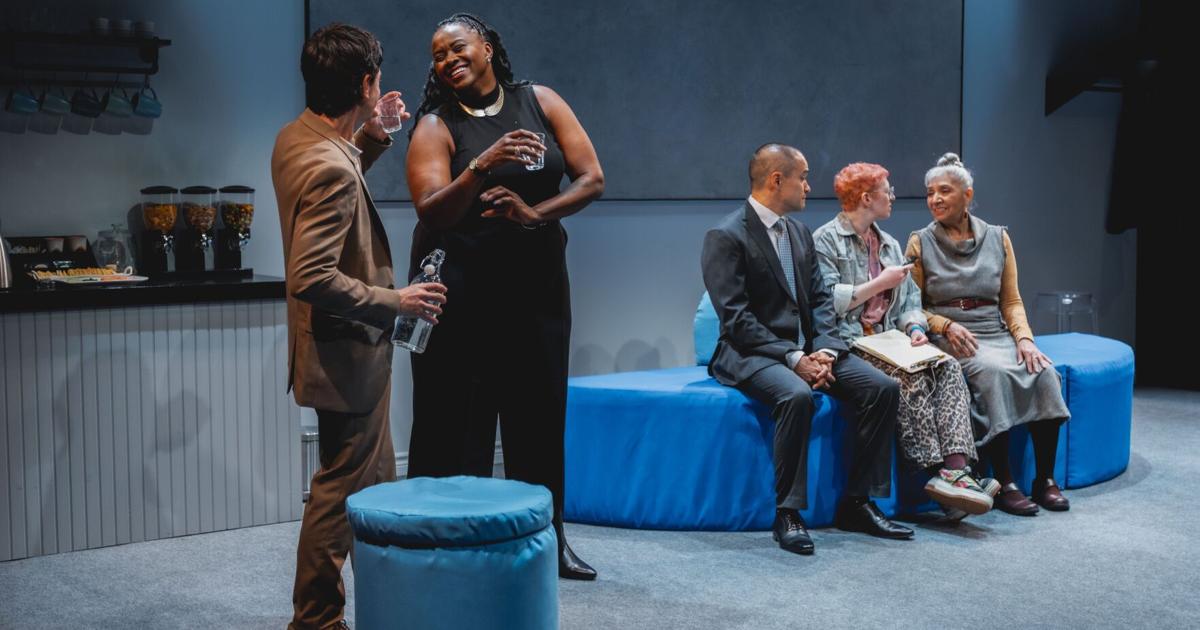Verbatim theatre is predicated on a paradox: You must blur the truth to arrive at a greater truth.
This sub-genre of documentary theatre is mostly drawn from the spoken words of real people, usually interviewed by the playwright.
But the resulting product isn’t a documentary — at least not in the traditional sense. While the interviewees’ words make up the script of the play, they’re voiced and embodied by actors who interpret the dialogue in their own unique ways.
This decoupling of the words from their speaker blurs an audience’s sense of reality, but also reveals a broader, more universal truth. What’s said is greater than any one individual, and when we hear it delivered in an unexpected context we listen more intently.
In Sunny Drake‘s hilarious and affecting new play “Child-ish,” now marking its Toronto premiere at Tarragon Theatre‘s Extraspace, the words belong to a group of more than 40 elementary school-aged children, whom Drake interviewed over several years. They’re spoken, however, by an ensemble of four adult actors: Karl Ang, Janelle Cooper, Monique Mojica and Jordan Pettle. (A fifth performer, Asher Rose, plays Drake.)
“Child-ish” runs for a brisk 70 minutes, but the project’s scope and ambition are reminiscent of the American filmmaker Richard Linklater.
The play begins on a superficial note, with Drake’s rambunctious subjects discussing everything from unicorns and dancing chickens to their pets and schoolyard crushes. A few find it funny to toy with the playwright’s tape recorder.
Yet as “Child-ish” unfolds, it heads to some astonishing places. Playful banter melds into longer monologues. Gradually, the children open up about more serious topics: war, religion, love, friendship, even death.
Unprompted, one child starts to talk about how they helped a friend who was dealing with suicidal thoughts. Others discuss their own journeys navigating depression and anxiety.
What moved me most, however, was a scene in which the kids recount their experiences of losing loved ones — from family pets, to grandparents and even parents. “It feels like your family got smaller,” one says. In that moment, it brought me right back to my grandmother’s death when I was 10, and the painful, aching sadness that accompanied it.
Drake’s play is tightly structured. First, we see Rose, as the playwright, asking the kids a series of questions. Then we watch the subjects interview themselves. Later, the tables turn and it’s the children asking Rose the questions.
At times, I wished “Child-ish” was more free-flowing. But it’s also easy to imagine how messy this work could have been without this set structure.
That Drake’s play lands with such impact is mostly thanks to director Andrea Donaldson’s production. The key here is that none of the actors play their roles as children. That’s to say that “Child-ish” is by no means childish. And while often humorous, there isn’t a silly bone in its body.
Instead, in their mannerisms, the performers portray their characters as grown adults. Costume designer Ming Wong dresses them in office attire. Amanda Wong’s set resembles a nondescript office lounge — the only splash of colour coming from a turquoise curved sofa.
This dissonance — between the adults we see onstage and the speech we hear out of their mouths — forces audiences to step back and reflect.
I found myself asking why we don’t seek out the wisdom of our littlest ones more often. Even when they’re eager to engage in serious discussions, why do we so often fail to take them seriously? Is it in how they behave and in their mannerisms? If so, what do we miss when we overlook their perspective?
Drake’s work also made me think about what we lose when we transition into adulthood. Our curiosity? Our passion? Our imaginations? Our convictions? Maybe a bit of all those things.
Perhaps the most important takeaway from Drake’s play, however: We need to listen — really listen — to children more often. Experiencing “Child-ish” is a great way to start.
Error! Sorry, there was an error processing your request.
There was a problem with the recaptcha. Please try again.
You may unsubscribe at any time. By signing up, you agree to our terms of use and privacy policy. This site is protected by reCAPTCHA and the Google privacy policy and terms of service apply.
Want more of the latest from us? Sign up for more at our newsletter page.



